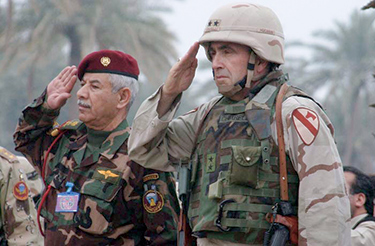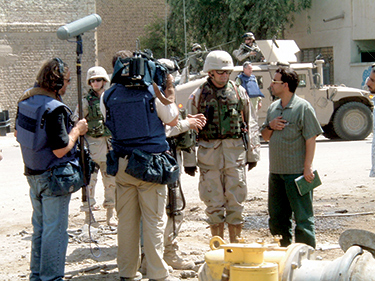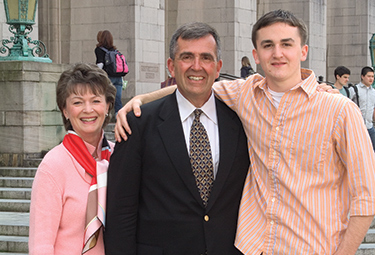Until this year, if you asked Major General Peter Chiarelli, ’80, about his most unforgettable day, he would tell you about Sept. 11, 2001. He was sitting in the Army’s situation room in the Pentagon as American Airlines Flight 77 plunged into the west side of the building — killing 189, including about 15 of his personal friends and colleagues. “We were one wedge away from the impact,” he says.
But now, after a year as commander of the U.S. troops in charge of security in Baghdad, the UW graduate has a new landmark in his life, a day when he saw tears in the eyes of his soldiers and Iraqis holding up purple index fingers to photographers from around the world.
For Chiarelli, head of the U.S. Army’s First Cavalry Division, the Iraqi election of Jan. 30 was a turning point in his personal life, in the life of the Army, for the citizens of Iraq and perhaps for the people of the Middle East.

Maj. Gen. Peter Chiarelli (right), ’80, salutes as he is about to leave Baghdad after almost a year in charge of the city’s security. Photo courtesy Dept. of Defense.
The highest ranking UW alumnus to serve in Iraq, Chiarelli says “the war has changed me in ways that I haven’t even figured out yet.”
From March 2004 to Feb. 2005, the First Cavalry was in charge of security for Baghdad. It also fought alongside Marines in Fallujah and Najaf. When its 18,000 soldiers (and 4,000 National Guard troops attached to the unit) left Iraq at the end of February, 165 didn’t come back. Another 1,500 were wounded — many seriously.
A Seattle native, Chiarelli returned to his wife of 32 years, Beth, and three children who all graduated from the UW — Peter, ’96; Erin, ’00; and Patrick, who is a freshman. While it was a happy homecoming, he says the hardest part of being a general is meeting the loved ones of those who died in battle. “It’s hard when I have to face the wife or the parents of a soldier lost in combat. When I came home, I went to see my soldiers at Walter Reed who have lost their legs or their arms. Those are the toughest times,” he says.
Which is why Jan. 30 was so meaningful. To Chiarelli, it justified all the sacrifices they had made. “That Iraqis would risk their lives and go out and vote in such numbers,” he says, “it was emotional.”
But no one, including Chiarelli, thought it would go as well as it did. The Americans had done extensive polling of the Iraqi population prior to Jan. 30. “We knew that Iraqis were going to vote,” he says, but the planners also knew both governments were taking a serious risk.
The insurgents, promising a wave of suicide bombings, had spread leaflets warning Iraqis to stay away from the polls or face death. Some Islamic leaders told their followers to boycott the vote. In the weeks leading up to the election, a few political figures in Iraq and the U.S. called for a postponement while others insisted it go on as planned.
“The Iraqis were totally opposed to anyone taking away their right to vote. When they dipped their fingers in indelible ink, it was a sign of defiance.”
Maj. Gen. Peter Chiarelli
While this public tug-of-war was playing out, Chiarelli and other American and Iraqi leaders were privately preparing for election day. Many of their tactical decisions are still classified. However, Chiarelli was able to offer a few insights into the security operations. Normally commanding 22,000 troops, he had more than 37,000 soldiers under his authority on Jan. 30. If you count the members of the Iraqi National Guard, the total goes up to 42,000.
He scoffs at rumors that mechanics were pulled out of the motor pool and cooks off the kitchen line to swell the ranks of soldiers on patrol. “We made sure that every soldier we could find was trained to do the work. There were innovative ways to get people, but I’m not going to say any more because we may need to do the same thing again someday,” he says.
Iraqis and Americans swept up about 2,500 suspected insurgents the month prior to the election, increasing the ranks of detainees to 8,000-the highest total since the invasion. Americans also stockpiled ammunition, food and fuel in the weeks before the vote so that there would be no need for convoys (a favorite insurgent target) on election day.

A TV crew interviews Maj. Gen. Chiarelli prior to the Iraqi elections. On election day, ABC’s Peter Jennings followed Chiarelli as he toured the city. Photo courtesy Dept. of Defense.
The Iraqi troops, many trained by the First Cavalry, took charge of security around the polling stations. The Americans reinforced those troops, running roadblocks and checkpoints throughout the city.
One tactic to foil suicide bombers was the overnight placement of road barriers. Streets that were normally arterials suddenly became dead-ends. With most traffic banned, Baghdad became a pedestrian zone for the day. “The barrier plan was meant to stop anyone with an VIED [vehicle-borne improvised explosive device] in a vehicle,” Chiarelli explains.
The confusion worked, although there were still 106 attacks and nine suicide bombings. “The Iraqis were totally opposed to anyone taking away their right to vote,” he says. “When they dipped their fingers in indelible ink, it was a sign of defiance.”
Because any Iraqi who gets food ration coupons was automatically registered (and because almost all Iraqis take advantage of the program), care needs to be taken when looking at overall voter participation. Chiarelli says it was about 58 percent-higher than participation in the 2004 national election in the United States (55.3 percent) if you count all U.S. adults who are of voting age.
Watching Iraqis risk their lives to vote was transformative, he adds. “No American who was there will ever look at voting the same way.”
He says that there is now a sense of hope for the future in Iraq. After watching the new parliament hold its first session, he says “the Iraqis are going to come up with what they feel is the best government.” One sign of a turnaround: 40 Sunni clerics who urged their followers not to vote are now encouraging Sunnis to join the army and the police. “This is huge,” he says.
Prior to the election, Iraqi media outlets refused to run announcements about a tip line for reporting suspected insurgents. After the election, he says, five newspapers began to run ads asking for the same information.
Attacks on coalition forces peaked at about 140 a day prior to the election. In April they were at 30-40 a day, although insurgents heightened attacks in May after the new Iraqi cabinet was formed.
“The real story is the success of the U.S. Army to adapt to a new kind of war. It amazes me, the adaptability of the American soldier.”
Maj. Gen. Peter Chiarelli
There are now hints of troop withdrawals. At one press conference during his tour of duty, Chiarelli told reporters that “you don’t build an army in a few months or even a couple of years.” Yet he is upbeat about the prospect of some American troops returning home. Current plans call for Iraqis to take over security for most of Baghdad around the first of the year, he explains.
They are already in charge of one of Baghdad’s main districts, the neightborhood around Haifa Street.
But it doesn’t mean the insurgency is just going to disappear. Chiarelli admits that there are still crushing conditions in Baghdad that contribute to the uprising. “If you had 13 mouths to feed and you were surrounded by garbage and sewage and you were unemployed and someone offered you money to do something against coalition forces, you’d do it if you had to support your family,” he declares.
Loss of honor, he says, is another factor in recruiting insurgents, as well as distrust of the Americans. “The Iraqis thought that the coalition was going to fix everything. After all, we were the people who put a man on the moon. They thought if we didn’t fix the electricity, if we didn’t clean up the sewage, it was because we didn’t want to get it done,” he adds.

Just a few weeks after returning to the U.S., Chiarelli and his wife visited the UW campus to give a talk and see their son, who is a freshman. Left to right, Beth, Peter and Patrick Chiarelli stand on “Red Square.” Photo by Kathy Sauber.
But he says the “mainstream media” often tell only half the story when it comes to the insurgency. “They reported how a suicide bomber killed 100 men at a police recruiting station. They didn’t report that the next day, 300 showed up to apply.”
Also missing is much coverage of what Chiarelli calls “a terrible mistake” by Al Qaida leadership. Osama bin Laden, who is a Saudi, named Jordanian terrorist leader Abu Musab al-Zarqawi the “prince” of Iraq. That two foreigners would decide to impose their own leadership on the nation was offensive to most Iraqis, he maintains.
Chiarelli feels that Iraq and its allies may be turning the corner on the domestic insurgency. “If we can get these insurgents under control, maybe we can focus on international terrorists in Iraq.”
While Chiarelli is upbeat about future prospects for Iraq, he doesn’t like to look back. Point out to him that many of the justifications to go to war-such as that Saddam Hussein had weapons of mass destruction or links to Al Qaida-turned out to be wrong, and he sidesteps any criticism of U.S. policy. “I’m not a policy guy,” he says. “I can’t comment on that. You are putting me in the position of a policymaker. That’s something that the American people have to decide.”
Asked about criticism by Sen. John McCain and others that there were not enough troops in Iraq to secure the country after the invasion, he replies, “I had enough forces that I needed to do the mission assigned to me. It’s the truth.”
Mention the prisoner abuse at Abu Ghraib, which happened before the First Cavalry arrived in Iraq but broke in the press during its tour of duty, and the general will talk about the “glass being half full.” He says he told Iraqis that Americans don’t run away from these incidents, and that once the abuse was known, “we absolutely followed the rule of law” in each case.
It’s no surprise that the general is more comfortable talking about a subject close to his heart. “The real story is the success of the U.S. Army to adapt to a new kind of war,” he says. “It amazes me, the adaptability of the American soldier.”
He discusses at length the non-lethal operations of occupying Baghdad. He says his unit’s four main non-lethal tasks-improve infrastructure, teach democracy, create jobs and provide information-were oftentimes more important than traditional Army tasks.
“If people’s human needs are not met, it’s going to be an opportunity for the insurgents to recruit,” he says.
Here’s where his two years in the Evans School of Public Affairs (he has a master’s degree from the UW and a B.A. from Seattle University) come in. Chiarelli will rattle off statistics about improvements to Baghdad as if he were a city planner-or even its mayor. When the U.S. arrived, only 20 percent of the household garbage was picked up at least twice a week. Now Chiarelli brags that 75 percent is picked up twice a week and 90 percent at least once a week. His troops delivered running water to 200,000 homes in the city just a few weeks before they left for Fort Hood.
The unemployment rate in Sadr City, Baghdad’s notorious slum, was 61 percent when the First Cavalry arrived. Now it is down to 21 percent. He talks about the price of labor and looks forward to the day when workers will be wooed away from the Army’s “WPA” projects that pay $5 to $7 a day.
Which is all rather unusual coming from a general running a mechanized Army division with the First Cavalry’s history. The unit can trace its roots back to 1833 and counts among its antecedents the troops under General George Custer that were annihilated at the Battle of Little Big Horn. But Chiarelli says that the two years he spent at the UW-and the next four years he spent teaching at West Point-gave him the tools necessary to be a success in Baghdad. “I always tell young officers, you need a broad-based education,” he says.
Which brings him back to the elections of Jan. 30. He says the seeds of democracy planted in Iraq are spreading.
Citing recent events in Lebanon and Egypt, he says, “What you see are signs of democracy throughout the region. This is really something.”
“After the elections, the mayor of Baghdad told me, ‘The governments of the region are nervous. The people of the region are envious.’ ”